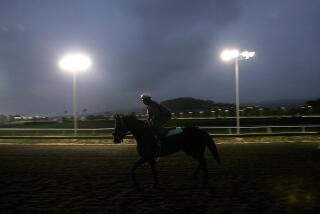Peace Brings Horse Racing Back to Beirut : Sports: Track is open--once a week--for the first time in five years. The facility has been a frequent target during the civil war.
- Share via
BEIRUT — In a former no man’s land, the Arabian steeds are racing again.
For the first time in five years, they were off and running at the Beirut racetrack last Sunday. A record 25,000 fans packed bullet-scarred stands.
The track sits on Beirut’s now-dismantled Green Line, which divided the city into Christian and Muslim sectors during the 15-year civil war.
The resumption of racing was trumpeted by the local media as a milestone in government efforts to reunite the capital as a key element for ending that war.
Throughout the war years, the track was a frequent target.
“This is a day to remember, a moment of thrill,” said millionaire sportsman Henry Faroun, 92, founder of the racetrack and chairman of the committee that runs it.
Thousands of Muslims and Christians shouted cheers of “May God prolong your life!” and “God bless you!” as attendants carried Faroun, disabled for seven months with a broken hip, to the committee’s glassed-in tower.
“It has been my dream to see the horses racing again in Beirut before I die. That dream has come true,” Faroun told reporters. “The track is a prime symbol of national unity.”
The eight jockeys in the first race then trooped in to pay their respects, and Faroun burst into tears when his stable’s jockey kissed his hand.
“Don’t think I’m sad. I’m crying with joy,” Faroun said.
The first race was won by Sword of the Prince. Everyone’s Darling took the second and the third went to Saydoun. Goodboy won the fourth, Amir the fifth.
The committee announced through loudspeakers that racing will be held only on Sundays until there are enough trained horses to race twice a week.
Government troops and riot police patrolled to maintain law and order.
In the old days, up to 10,000 people would gather at the wooden hippodrome to bet on races at the 1,600-yard oval. Politics was never discussed at the track, founded in 1916 during Ottoman rule.
The track’s governors take pride that theirs is the only track in the world that races only the Arabian breed. Thoroughbreds are prohibited.
When the civil war broke out in April, 1975, the track and its stands were seriously damaged and it was closed for two years.
It was reopened in 1977 when the Syrian army intervened to snuff out the fighting, even though snipers from both sides still fired from shell-pocked apartment buildings overlooking the track.
The first race that year was won by a white Arabian named Simsam, or Sword, despite a gunshot wound to the neck. The track was repeatedly caught in the cross-fire after that, and it was closed again.
During a brief opening in 1979, gunmen opened up on the horses lined up for the annual Christmas race, then raked the crowded stands, wounding three spectators.
When the Israeli army invaded and besieged Beirut’s Muslim sector in 1982, 120 horses were killed and most of the surrounding pine woods were set on fire in the fighting.
Races resumed late in 1983. At the New Year’s Day race in 1984, one horse collapsed on the course, bringing down four others.
A 92-1 long shot named Commodore romped home, causing a public uproar, and the race committee canceled the result. One man who had bet heavily on Commodore stormed off shouting threats. Minutes later a rocket-propelled grenade hit the committee tower, but no one was injured.
The track was closed again in February, 1985, when a militia commander fired three grenades into the air over the stands, reportedly because the committee refused to pay him protection money.
More to Read
Go beyond the scoreboard
Get the latest on L.A.'s teams in the daily Sports Report newsletter.
You may occasionally receive promotional content from the Los Angeles Times.










